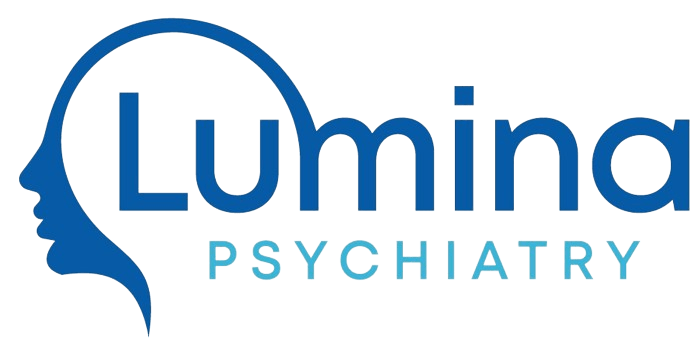Bipolar Disorder Treatment at Lumina Psychiatry
Bipolar Disorder is a chronic mental health condition characterized by significant mood swings, including emotional highs (mania or hypomania) and lows (depression). These mood swings can affect sleep, energy levels, behavior, judgment, and the ability to think clearly. Episodes of mood swings may occur rarely or multiple times a year, and between episodes, many people with Bipolar Disorder are free of mood changes. At Lumina Psychiatry, we understand the challenges that come with Bipolar Disorder and are dedicated to providing compassionate and comprehensive care to help manage these symptoms effectively.
Our Personalized Approach to Bipolar Disorder Management At Lumina Psychiatry, our approach to managing Bipolar Disorder is as unique as the individuals we serve. We combine the latest in psychiatric research with a holistic treatment model to address the full spectrum of symptoms associated with Bipolar Disorder. Our team of mental health professionals is committed to creating personalized treatment plans that encompass medication management, psychotherapy, and lifestyle adjustments to support overall well-being.
Medication Management for Bipolar Disorder
Effective management of Bipolar Disorder often requires a carefully tailored medication strategy. Our psychiatrists at Lumina Psychiatry are experts in the complexities of bipolar medication management, ensuring that each patient receives the optimal combination of medications to manage their symptoms while minimizing side effects. Our approach includes:
Mood Stabilizers:
These are the cornerstone of Bipolar Disorder treatment, helping to maintain emotional balance and prevent the extreme highs and lows. Examples include lithium, which is known for its efficacy in reducing mania and depression risk, and valproate, which is often used for its rapid mood-stabilizing effects.Antipsychotics:
For those experiencing severe manic or mixed episodes, antipsychotics can be crucial in bringing about a quicker resolution of symptoms. Options like quetiapine (Seroquel) and aripiprazole (Abilify) are commonly prescribed, sometimes in combination with mood stabilizers.Antidepressants:
Managing the depressive phases of Bipolar Disorder may involve the use of antidepressants. To avoid triggering a manic episode, antidepressants are usually prescribed in conjunction with a mood stabilizer or antipsychotic. Our team selects the most appropriate antidepressant with caution, considering the patient’s overall treatment plan.Other Medications:
Depending on individual needs, additional medications such as anti-anxiety medications or sleep aids might be used temporarily to manage specific symptoms like insomnia or anxiety, which often accompany mood episodes.Addressing Co-Occurring Disorders
It’s not uncommon for individuals with Bipolar Disorder to experience co-occurring mental health conditions, such as anxiety disorders, substance use disorders, or ADHD. These conditions can complicate the diagnosis and treatment of Bipolar Disorder, requiring a comprehensive and integrated treatment approach. At Lumina Psychiatry, we recognize the importance of identifying and treating these co-occurring disorders as part of the overall care plan. Our multidisciplinary team is equipped to provide a coordinated treatment approach that addresses all aspects of an individual’s mental health, ensuring a holistic path to wellness.
Psychotherapy
In addition to medication, psychotherapy is an essential component of effective Bipolar Disorder treatment. Psychotherapy can provide support, education, and guidance to patients and their families. Therapeutic approaches may include:
Cognitive Behavioral Therapy (CBT):
Helps individuals identify and change harmful patterns of thinking and behavior.Family Therapy:
Helps family members improve communication and resolve conflicts.Psychoeducation:
Teaches individuals about Bipolar Disorder and its treatment to help better manage their condition.Lifestyle and Wellness Counseling:
Focuses on healthy habits, such as regular exercise, sleep hygiene, and stress management techniques, to improve the overall quality of life.Our Commitment to Your Well-being At Lumina Psychiatry, we’re not just treating symptoms; we’re treating individuals. We understand the complexities of Bipolar Disorder and are here to support you through every step of your journey towards stability and wellness. Our team is dedicated to providing a caring and understanding environment where you can feel safe to discuss your concerns and challenges.
Start Your Path to Stability Today If you or a loved one is struggling with Bipolar Disorder, Lumina Psychiatry is here to help. Our comprehensive treatment approach is designed to address the unique challenges of Bipolar Disorder, providing support and expertise to guide you towards a balanced and fulfilling life. Contact us today to learn more about our services and how we can assist you in managing Bipolar Disorder.
Frequently Asked Questions about Bipolar Disorder Treatment at Lumina Psychiatry
Bipolar Disorder is a mental health condition characterized by significant mood swings, including periods of depression and episodes of mania or hypomania. Diagnosis involves a detailed clinical assessment, including a review of symptoms, medical history, and sometimes, physical examinations and tests to rule out other conditions.
We offer a comprehensive treatment approach that includes medication management, psychotherapy, and lifestyle counseling. Our treatment plans are tailored to each individual’s needs, considering any co-occurring mental health conditions.
Medication management is a critical component of Bipolar Disorder treatment, involving mood stabilizers, antipsychotics, and sometimes antidepressants. Our psychiatrists work closely with patients to find the most effective medication regimen while minimizing side effects.
While medication is often necessary to manage the mood swings associated with Bipolar Disorder, psychotherapy and lifestyle adjustments can also play significant roles in treatment. For some, these approaches may suffice, but most patients benefit from a combination of medication and therapy.
Yes, it’s common for individuals with Bipolar Disorder to experience co-occurring mental health conditions, such as anxiety disorders, ADHD, or substance use disorders. Our integrated treatment approach addresses these co-occurring conditions alongside Bipolar Disorder.
CBT is a form of psychotherapy that helps patients identify and change negative thought patterns and behaviors. For Bipolar Disorder, CBT can be particularly helpful in managing symptoms, reducing the frequency of mood swings, and improving overall functioning.
The duration of treatment varies widely among individuals. Bipolar Disorder is a chronic condition that typically requires long-term management. The initial phase of treatment, focusing on symptom control, may take several weeks to months, with ongoing treatment adjusted to maintain stability.
Starting treatment begins with an initial consultation to discuss your symptoms and health history. Contact us to schedule an appointment, and we’ll guide you through the steps to begin your personalized treatment plan.
Yes, we offer psychoeducation and family therapy sessions to help families understand Bipolar Disorder, improve communication, and develop strategies to support their loved one effectively.
Absolutely. Regular exercise, a healthy diet, consistent sleep patterns, and stress management techniques can all support treatment and contribute to better overall well-being.


